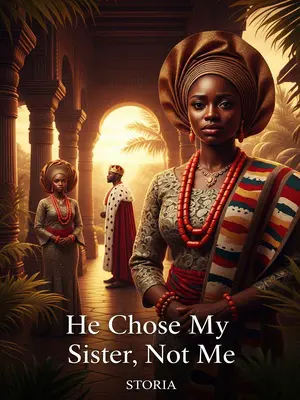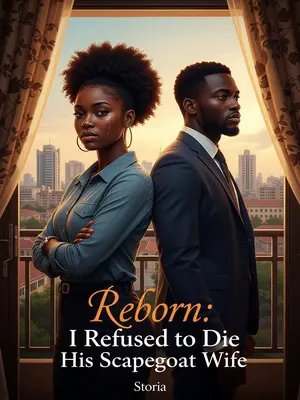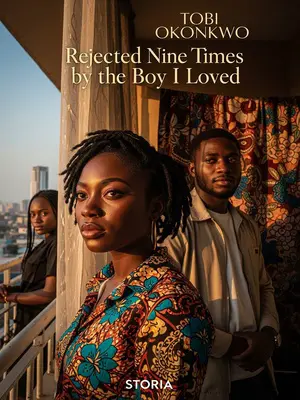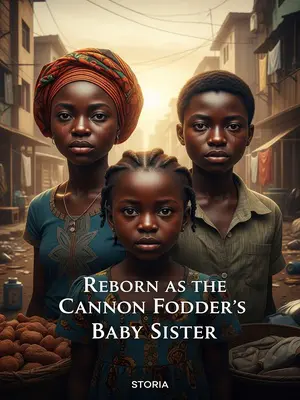Chapter 1: The Flower Ball Betrayal
After I returned from the land of the dead, I still chose to toss the flower ball to Tunde.
The hibiscus petals felt cool in my palm, freshly plucked that morning from Mama’s garden, their red scent lingering on my fingers like zobo syrup. I could feel everybody’s eyes on me—some hopeful, some anxious, most just waiting for what they already thought would happen. I inhaled sharply, squared my shoulders the way Mama taught me, and tossed the flower ball, letting my wrist flick with a grace I didn’t know I still had.
I thought he would catch it, just like he did in my last life.
In that other life, he never missed anything I sent his way—my laughter, my pain, or even my clumsy mistakes. I braced myself for the same gentle smile, the same sure hands.
But as the flower ball, made with hibiscus flowers, flew through the air, he shifted a bit, letting it pass him by.
For a split second, everything slowed. The ball arced in the sun, shadows chasing across the compound. Tunde’s feet moved—a deliberate shift, too smooth to be an accident. My breath caught. For the first time, fear gripped me like cold water poured down my back.
The flower ball dropped into the fish pond with a soft splash, making small ripples spread across the water.
A hush fell over the crowd as if someone had drawn a thick line across the moment. The fishes scattered, bubbles rising like tiny questions. The fragrance of hibiscus mixed with the earthy smell of pond water and something sharp in my chest.
Right then, I finally understood.
The truth stung me, sharp and sudden, like harmattan dust blowing straight into my eyes. It wasn’t chance. It wasn’t mistake. It was choice—a choice I never saw coming, not after everything.
He too had come back to life.
Somewhere in the corner of my mind, a bell tolled: so I’m not alone in this strangeness. We were both carrying old memories, the weight of things that never left.
And this time, he no longer wanted to marry me.
My heart fell into that pond, sinking past the petals and the fishes, into cold, silent water.
The flower ball rolled into the pond, and everywhere went quiet.
The air was thick, like the sky before rain. The daughters of chiefs and titled women that used to flock around me, their wrappers and beads shining, now watched me with wide eyes—some biting their lips, others shifting on their feet, afraid of wahala. Even the gossip aunties nearby held their tongues, for once.
I felt the weight of their stares, hot and prickly, as if they expected me to throw myself on the ground or scream. But I just stood still, whispering a silent prayer in my heart—God, don’t let me disgrace my family today. I held my back straight, even though my heart beat like the talking drum during New Yam festival.
After all, Tunde and I had been childhood sweethearts. Everyone just believed our marriage was set in stone.
People used to say we were like palm wine and kola nut—always together, sweet and strong. My aunties would tease me, saying, “Ah, Morayo, you don catch husband since pikin time!” Sometimes, I believed them.
In my past life, I really did marry into the Adeyemi family, just as I wanted.
I wore their colors, learned their ways, sat at family meetings with the older women, and dreamed in the big compound by the river. It was the life I thought I wanted—the life everybody said was mine by right.
Tunde treated me with full devotion. He took me to paddle canoe on the river, go horse riding, and we enjoyed all the fine things in Makurdi together.
He would surprise me with roasted maize and groundnut by the riverbank, or pull me onto his horse when nobody was looking. In the evenings, we’d sit by lantern light, talking about everything and nothing until the crickets grew tired.
Even for the first two years after our wedding, when I couldn't get pregnant, he still rejected the wives his mother wanted to bring in. He only said, "As long as Morayo is in the family compound, I'm satisfied for this life."
People whispered, Mama prayed, but Tunde never wavered. He’d hold my hand at night and tease, “Who needs noisy children when I have you?” Even Mama Iya, who never praised anybody, called him a real man.
I spent more than ten years by his side. Even when sickness finally carried me away, his heart never changed.
He wept at my funeral, tears streaming down his face, refusing to let anyone touch my things. They said he stayed up all night for weeks, clutching my wrapper as if it could bring me back.
So, after coming back to life, I still chose to throw the flower ball to Tunde.
It felt like fate, or the will of the ancestors. How could I do anything different, knowing how deep our love ran before?
I thought he would catch it as always, but this life, everything was different.
The wind felt colder on my skin, and my hands, so sure a moment ago, now trembled like plantain leaves in a storm.
A weaverbird chirped twice in the tree with flowers, bringing me back to myself.
Its call was sharp, almost mocking. The tree above me shook, petals falling onto my wrapper. Life around me kept moving, not caring about my heartbreak.
A young woman beside me tried to comfort me: "Maybe Captain Tunde just missed it—who knows..."
She leaned close, her perfume smelling faintly of camphor and coconut oil. Her voice was low, worried. I knew she meant well, but her words were empty, drifting away like dry harmattan leaves.
But Tunde was from a military family, sharp in riding and shooting. His reflexes were top notch. Not to talk of a flower ball—he could catch a flying stick without blinking.
People still joked about how he caught my cousin’s lost gele in mid-air during Mama’s birthday last year. Tunde didn’t miss.
How he go miss this one?
I almost wanted to laugh. I kept the smile inside, my lips pressed together. My pride would not let me show weakness in front of this crowd.
The way everybody was looking at me felt like hot coal burning my skin, making my face hot.
I wanted to scratch my cheek, to run, to hide, but I just stood there. Sweat prickled under my head tie, and my breath came in short bursts.
I kept quiet. I just watched as Tunde bent down to pick the flower ball from the pond and came towards me.
His steps were careful, measured. His white trousers were stained with mud at the hem, but he didn’t seem to notice. He held the flower ball as if it were something fragile, something that could break with a sigh.
"Miss Morayo, I'm sorry."
The words felt like rain on a tin roof—steady, cold, impossible to ignore.
Just five words, calm and dry.
He sounded older than his years, voice flat like the harmattan plains. No trace of the boy who once laughed with me under mango trees.
A gentle breeze blew, making the hibiscus petals on the flower ball shake softly.
The petals shivered, some slipping free, drifting onto the stones. The air smelled of dust and flowers and something that felt like memory.
I looked up at him.
His eyes wouldn’t meet mine, but I caught the faint tremble in his hands, the way his jaw clenched. All the pride of the Adeyemi family was there, mixed with something softer, sadder.
Tunde too had been reborn—just like me, now back to his free and youthful seventeen-year-old self.
A strange knowledge flickered between us. I wondered, did he remember it all? The laughter, the fights, the promises whispered in the dark? Or was his second chance heavy with regret?
This year, the Ojo and Adeyemi families had already quietly discussed exchanging birth dates—a normal step before engagement. Just as they were about to announce our childhood betrothal, Tunde changed his mind.
Our mothers had begun weaving aso-oke for the wedding, whispering over pots of stew, planning the dances and the feasts. But now, the hush was louder than the talking.
At seventeen, Tunde was still as fine and lively as before, just how I remembered. But behind his lowered lashes, something deep had changed.
His shoulders were straighter, but the boyish grin was gone. He stood like a man who had already seen war.
He refused to catch my flower ball, stopped calling me Morayo, and didn't even want to look me in the eye.
The distance between us felt like a river, wide and impossible to cross.
The change was so sudden, nobody knew what to do.
The crowd fidgeted, a few people coughing awkwardly, as if their throats had dried up. Even the elders on their stools exchanged worried glances.
Even though I was born into a military family, I was trained in poetry and literature, good at making tea and keeping accounts, skilled at welcoming guests, writing poems, and playing the piano. Among all the daughters of chiefs in the city, I had always stood out.
My uncles would boast that I was as clever as any son, quoting proverbs and writing verses for local festivals. They said I had the spirit of a queen.
A Morayo like that was not someone to bow her head and cry.
I bit the inside of my cheek, refusing to let my tears fall in front of these people. I told myself, "Hold your head high, Morayo. They are watching, but you are not their clown."
The heat in my chest just got hotter.
It rose, burning in my throat, making my eyes sting. I clenched my fists so hard my nails dug into my palm, just to keep steady.
So I walked straight up to Tunde. Standing close enough to touch him, I grabbed the flower ball from his hand.
My hand trembled as I reached for the flower ball, but I forced myself not to flinch. Pride is the only wrapper I have left. My feet moved before I could think. The crowd parted like the Red Sea, their whispers following me. Tunde looked up, surprise flickering in his eyes as I snatched the ball.
Without looking back, I flung it into the crowd.
The movement was sharp, angry—a bird breaking out of a cage. My wrapper swished, and I could feel the tension snapping around me like lightning.
Who it hit, I no know—someone shouted in surprise behind me.
A startled "Ah!" rang out. Someone’s head tie nearly fell off. I didn’t turn to see whose head I had crowned with hibiscus.
I kept my eyes fixed on Tunde's lashes, which shook a bit with confusion, and I spoke each word slowly and clear:
"Tunde, you know me well.
I, Morayo Ojo, no dey forgive insult. If person do me anyhow, I no go let am slide."
My words hung in the air like thunder after lightning. The women beside me gasped. Even the elders shifted on their stools, muttering among themselves about the stubbornness of Ojo blood.
He stepped back twice, mouth open like he wanted to talk, but nothing came out. In that silence, I knew: the old Tunde was gone, and so was the life I thought I’d live.







